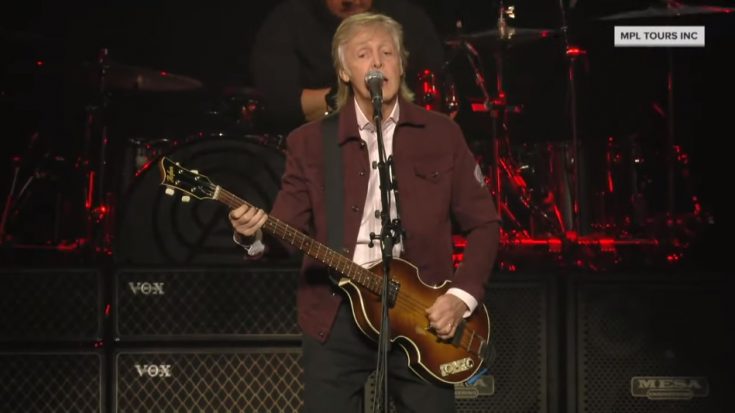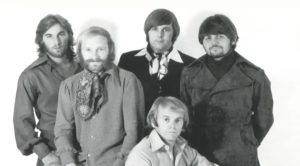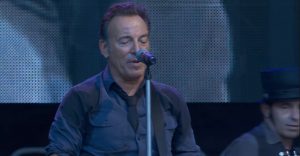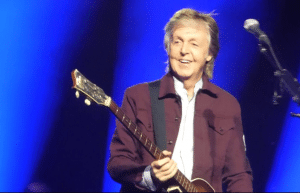How Paul McCartney Made A Full Circle Moment By Visiting Russia

Paul McCartney's recent live concerts - TODAY / YouTube
For decades, Paul McCartney traveled the world, bringing his music to nearly every corner of the globe. Yet, despite his immense fame, Russia remained a place he hadn’t set foot in for much of his career. During the Beatles’ heyday and even later with Wings, access to the Soviet Union was off-limits, leaving a curious gap in McCartney’s otherwise global experiences.
It wasn’t until 2003 that McCartney finally crossed Russia off his list, not as a Beatle, but as a solo performer. His arrival wasn’t just a casual tour stop; it carried a deeper, almost emotional significance. For McCartney, visiting Russia was about more than just performing—it was about completing a personal and musical journey that had started decades earlier.
This visit would give him the chance to bring a song that had once been forbidden within the Soviet Union back to its people. The dream of playing “Back in the U.S.S.R.” in the very land that inspired it was finally within reach—and it would turn out to be more electric than he ever imagined.
View this post on Instagram
Fulfilling a Long-Held Dream in Red Square
The Soviet Union had once shunned the Beatles, lumping them into the broader category of Western influence they sought to suppress. Even after the fall of the Iron Curtain, McCartney had yet to step foot in the country, the idea lingering in the back of his mind. “Back in the U.S.S.R.” was more than a playful Beatles track—it became a symbol of the complicated relationship between Western pop culture and Soviet censorship.
On May 24, 2003, McCartney stood in Moscow’s Red Square, playing to a massive crowd of 50,000 people. When he launched into “Back in the U.S.S.R.” during his encore, the crowd’s reaction was more powerful than even he had anticipated. According to McCartney, the energy was “just electric,” a confirmation that the song had never lost its meaning among the Russian people.
Adding the song to the encore felt like the perfect decision. McCartney realized mid-concert that “Back in the U.S.S.R.” didn’t belong buried in the setlist—it needed to be a highlight, a celebratory moment. And when he played it, not only was the audience ecstatic, but McCartney himself felt a rare sense of full-circle completion that transcended language and history.
View this post on Instagram
A Blend of Musical Inspirations
The song that ultimately brought McCartney to Russia was itself a unique mash-up of musical styles. “Back in the U.S.S.R.” was inspired by Chuck Berry’s “Back in the U.S.A.,” a song that celebrated the small joys of American life. McCartney decided to flip the concept on its head, creating a tongue-in-cheek anthem about pride in a very different homeland.
Mike Love of the Beach Boys also left his imprint on the song during a conversation with McCartney. Love suggested that McCartney structure the lyrics like “California Girls,” highlighting different places and women from the Soviet Union. The result was a playful yet affectionate nod to countries like Georgia, Ukraine, and Russia, all sung with a heavy dose of Beach Boys-style harmonies.
The vocal style McCartney used—channeling a bit of Jerry Lee Lewis energy—added even more character to the track. What started as a satirical pastiche evolved into an enduring classic, one that managed to resonate deeply with the very people it playfully referenced. For McCartney, performing it live in Russia decades later felt like finally delivering a long-held promise.
A Historic Moment with an Unexpected Audience
As if playing “Back in the U.S.S.R.” to thousands of adoring fans wasn’t enough, McCartney also found himself performing for one of Russia’s most powerful figures. Vladimir Putin attended the concert at Red Square, witnessing firsthand the Beatle’s triumphant moment. It was a surreal scene—an icon of Western pop culture serenading the heart of post-Soviet Russia.
McCartney’s performance wasn’t just a musical highlight; it was a subtle cultural bridge between two worlds that had once stood in stark opposition. The irony wasn’t lost on McCartney, who noted how the song, once banned, was now celebrated in the open air of Moscow’s most iconic plaza. It was a small but meaningful symbol of how much the world had changed.
For McCartney, that night in Russia wasn’t just another stop on tour. It was the culmination of a musical and personal dream decades in the making, a moment where past, present, and music all collided into something unforgettable. In a career filled with iconic milestones, this one stood apart—proof that sometimes, dreams really do come full circle.












